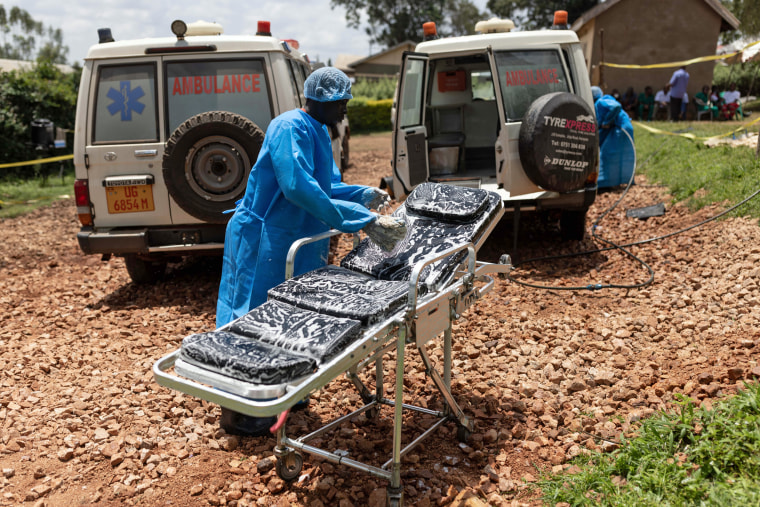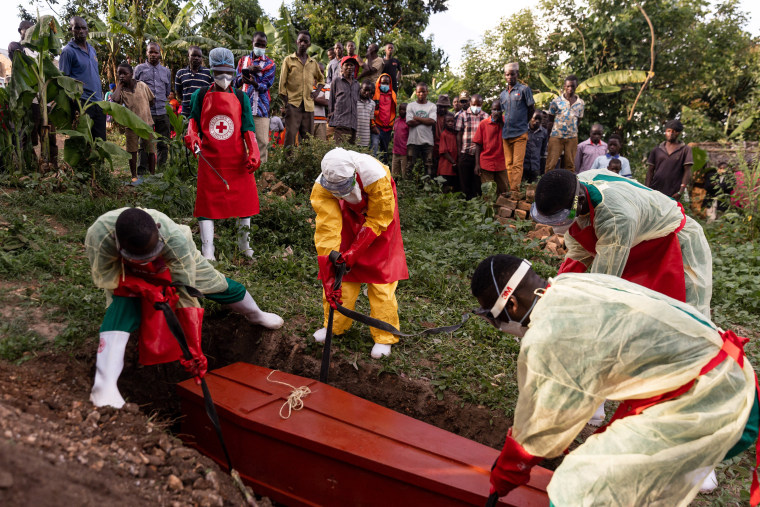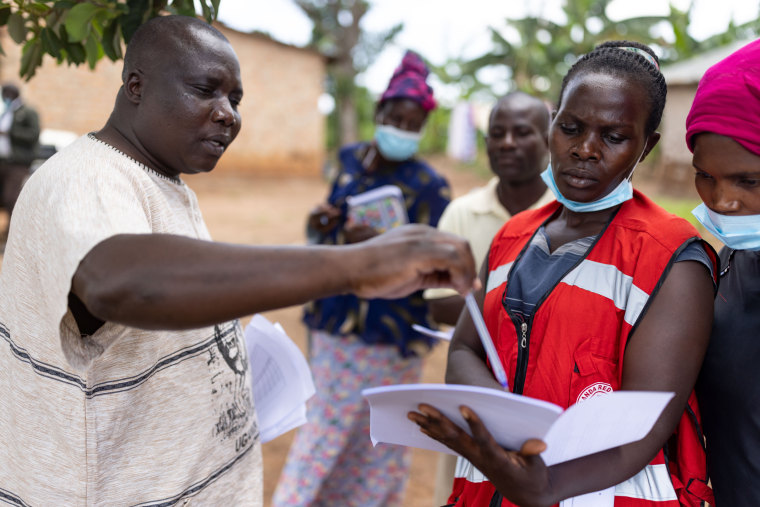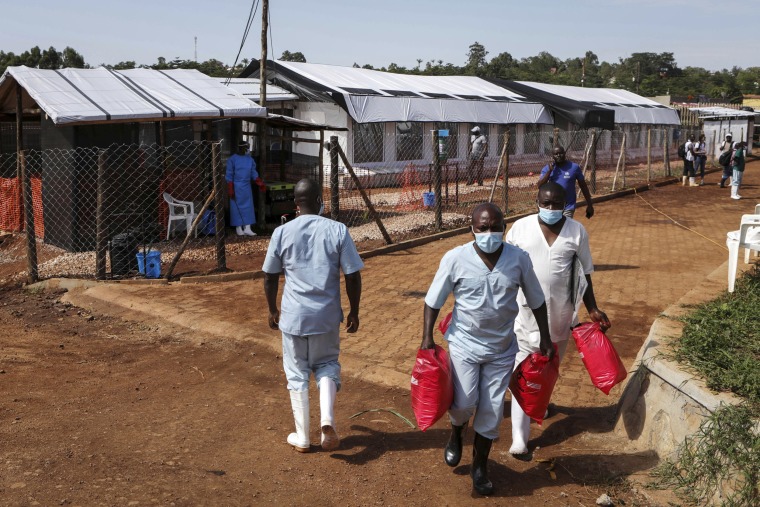When a feverish 24-year-old patient with convulsions, chest pain and bleeding eyes sought treatment at the Mubende Regional Referral Hospital in Central Uganda on Sept. 15, emergency staff swiftly isolated him, according to the country’s Health Ministry. The man, who was not named by officials, was later confirmed to be the first Ugandan case of the Ebola virus’ Sudan species in 10 years.
His death four days later sent shivers throughout the world. The United States began screening travelers from Uganda on Oct. 6 at five of its airports and alerted health care workers to raise awareness about the outbreak. The World Health Organization said it was “concerned that there may be more chains of transmission and more contacts than we know,” Director-General Tedros Adhanom Ghebreyesus told reporters Wednesday.
Meanwhile, at least 60 people have contracted the virus, resulting in at least 44 deaths, the WHO said Wednesday. But experts believe the actual number may be much higher.
The administration was initially hesitant to admit the outbreak, which jeopardized public support. The virus started spreading early in August and officials described it “a strange illness.“
But within a few weeks, once the first death was confirmed and amid fears the outbreak might overwhelm the country’s health care system, officials swiftly moved to contain the outbreak and placed its epicenter under a 21-day lockdown Oct. 15.
An overnight curfew and movement restrictions were imposed on the residents of Mubende and Kassanda districts.
Now, the East African country — lauded for its coronavirus response, which was built around engaging the community and training health officials — is drawing lessons from the first Ebola outbreak in 2004.
“They alerted the WHO early and put in the basic pillars of a response early,” Dr. Benjamin Black, an obstetrician, said recalling the West African Ebola response from 2014 to 2016.

Irene Nakasiita, a spokesperson for the Ugandan Red Cross, said the organization had been “drawing lessons from the first Ebola outbreak.”
A community-based approach has allowed the Red Cross to trace confirmed cases and their contacts quickly and effectively, she said.
The organization uses a tool called “Kobo,” she said, whereby 300 volunteers send alerts of any cases.
“For suspicious cases, we have to run to the ground quickly,” she said. The team is then able to deploy ambulances and correspond with the Health Ministry as needed.
“If you’re telling people they’re going to be isolated, they’re going to be waiting, potentially not getting treatment for something else,” Black said in a telephone interview. “It could be malaria or even typhoid. That has a huge impact on the bed space.”
Dignified burials
Health workers are going door to door, educating residents of the risks of the virus and the importance of hand hygiene. Red Cross volunteers clad in hazmat suits also provide for dignified burials, without family members of deceased patients present.
“We need to educate them so that they don’t turn out to be rowdy, wondering why we are not allowing them to bury their people” said Nakasiita, adding that funerals can become superspreader events since people can be exposed to the deceased patient’s bodily fluids.
Currently, no vaccine for this particular species is available.
But Ghebreyesus said Wednesday a clinical trial of vaccines to combat the Sudan species of the Ebola virus could start within weeks.

Two of those vaccines “could be put in clinical trial in Uganda in the coming weeks pending regulatory and other approvals from the Ugandan government,” he said.
While Ghebreyesus didn’t provide details of the vaccines, the Serum Institute of India is planning to develop 20,000 to 30,000 doses of an experimental vaccine for trials in November, according to Reuters.
“Mobilizing early detection and early response is the key to stopping an outbreak like this from becoming a pandemic,” Joe Agoada, founder of Sostento, a nonprofit group for front-line health workers, who ran several public health projects in Uganda between 2007 and 2012, said in a telephone interview.

Burnout
Uganda’s robust response, experts say, can be credited to its long history of tackling previous outbreaks. But it still faces a fatigued population that has been reeling from monkeypox and Covid.
“There’s burnout amongst health workers, health officials and the public across the board in Uganda,” Agoada said.
The threadlike Ebola virus spreads when it comes in contact with an infected person’s bodily fluids. At least 58 people have contracted the virus, resulting in at least 21 confirmed fatalities. But experts believe the actual number may be much higher.
The country also still suffers from a lack of rapid testing for the Sudan species, Ahmed Ogwell, the acting head of the Africa Centers for Disease Control and Prevention, said last week, adding that the continent, with its 1.3 billion people, was “on its own.”
Ebola can be difficult to detect because its early symptoms resemble that of malaria, which infects more than 220 million people around the world every year, according to the WHO.
Lockdown blunders and public complacency also threaten to fuel a spiraling outbreak. The first death was confirmed in the country’s capital after a listed close-contact patient left Mubende and sought treatment from a traditional healer. He later arrived at a hospital in the capital, Kampala, a city of some 1.5 million, where he died Oct. 7, President Yoweri Museveni said in a news release Oct. 12.
“When someone is sick and scared, sometimes the first thing they do is run and go to a facility they trust or a doctor they believe in,” Dr. John Niwagaba, who works as a physician in the capital and supported the Ugandan Ebola response in 2008, said in a call with NBC News.
“These are all known responses to diseases,” he said, adding that there has been currently no spread because of the case.

Unlike the previous outbreaks during which the virus was contained in the border regions of the country, this is the first time it has affected the center and the capital. More workers need to be recruited and trained quickly, Agoada said.
In addition, those who were infected and recovered also face stigmatization in the society, the Health Ministry said in its latest situation report.
Source: | This article originally belongs to Nbcnews.com










